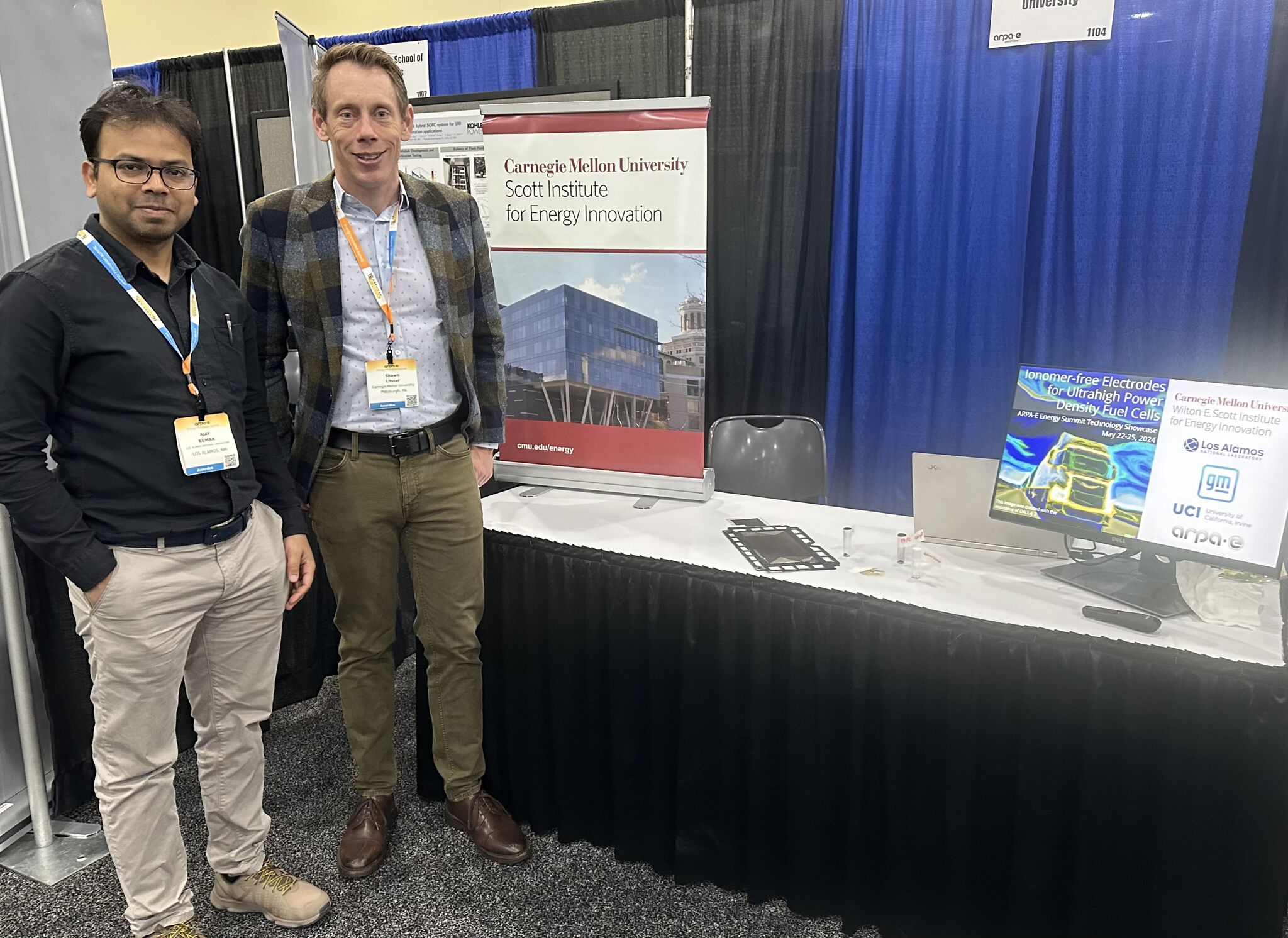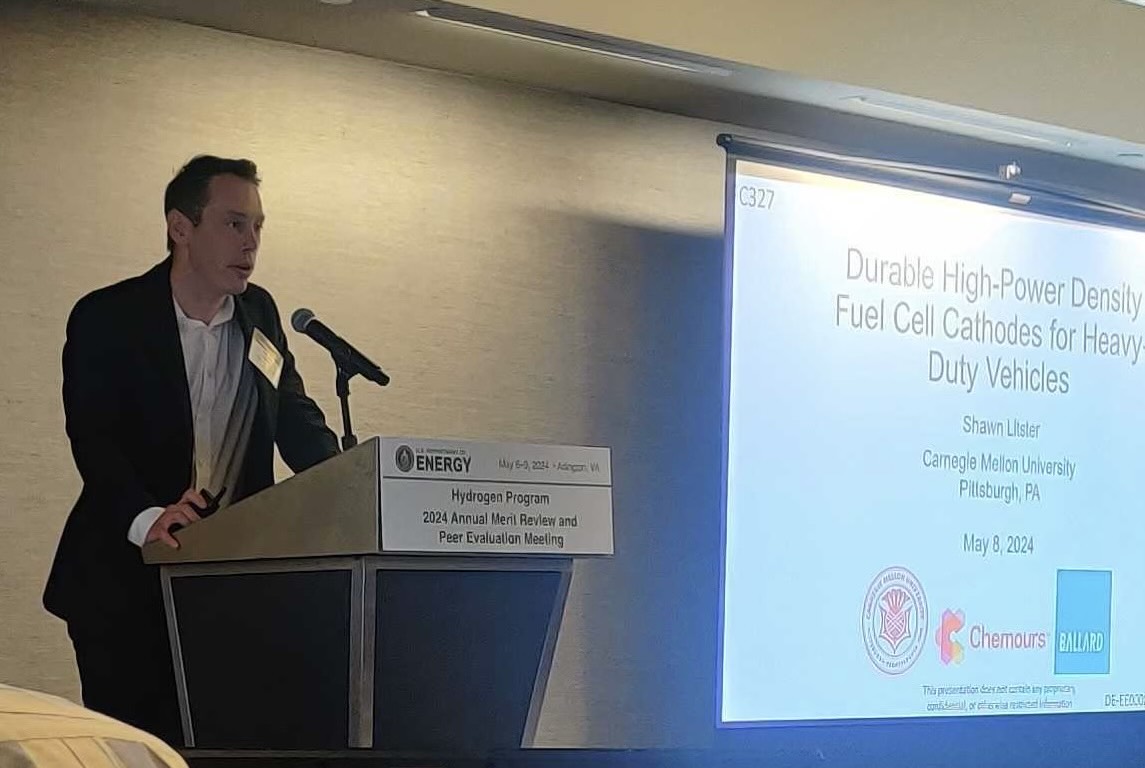
Professor Shawn Litster Shares Clean Hydrogen Research at Multiple National Conferences
By Cody Januszko
Media Inquiries- Digital Communications Manager
Hydrogen produced with low carbon emissions is a critical component of strategies for net zero emissions. Producing hydrogen in this way enables electrifying heavy-duty vehicles and reduces carbon emissions from a wide range of industrial processes, including the production of ammonia, steel, liquid fuels and cement. Clean hydrogen can be produced using electrolyzers powered by renewable electricity that splits water into hydrogen and oxygen. For heavy-duty vehicles, the hydrogen is electrochemically reacted with air in a fuel cell to efficiently produce electricity with only water as the exhaust.
Shawn Litster, Scott Institute Energy Fellow and Professor of Mechanical Engineering, is heavily involved in clean hydrogen research. Litster’s research generally focuses on sustainable energy conversion technologies that incorporate electrochemistry, including electrolyzers for producing hydrogen and fuel cells for vehicle powertrains. In late March of 2024, the DOE announced $750 million in funding for clean hydrogen projects, and $2.5 million will be directed to Litster’s lab over the next three years through collaboration with industry, national laboratories and other universities.
May was a busy month for Professor Litster, as he and members of his lab presented their work at three different conferences and meetings.
The U.S. Department of Energy’s Hydrogen Program held its Annual Merit Review and Peer Evaluation Meeting from May 6-9, 2024. At the annual meeting, the Hydrogen Program showcases researchers who contribute to the Program’s efforts and reviews their progress on projects that have received grant funding.
At this year’s Annual Merit Review, Litster’s presentation was titled “Durable High Power Density Fuel Cell Cathodes for Heavy-Duty Vehicles.” This presentation was the final presentation on the high oxygen permeability ionomer (HOPI) project, which aims to increase performance and reduce degradation, that the Litster lab conducted alongside Ballard Power Systems, The Chemours Company and collaborators in the DOE’s Million Mile Fuel Cell Truck (M2FCT) national laboratory consortium.

“It’s exciting that the DOE has both the strategy and funding to advance clean hydrogen in the United States,” said Jackie Kulfan, Director of Research Partnerships for the Scott Institute. “Attending the Annual Merit Reviews are the best way to foster partnerships with leading researchers from government, industry, national labs and other universities.”
The Advanced Research Projects Agency-Energy (ARPA-E) Energy Innovation Summit was held from May 22-24, 2024. A chance to meet with a variety of professionals in the energy space, the summit encourages attendees to think about novel solutions to our energy challenges. In collaboration with Los Alamos National Laboratory, General Motors and University of California Irvine, the Litster lab presented their work on ionomer-free electrodes for ultra-high power density fuel cells. This work challenges the ionomer-based electrode model of the past few decades, allowing for ionomer-free electrodes that can improve efficiency and durability.

“Presenting at these annual review meeting and conferences is critical for getting timely feedback from the national and international community on our research approach as well as keeping up-to-date with the latest results and research directions,” said Litster. “These meetings are also a wonderful showcase for sharing the important work of our dedicated student and post-doctoral researchers in the Scott Institute and CMU.”
Professor Litster also attended the 245th meeting of the Electrochemical Society (ECS) from May 26-30, 2024 in San Francisco. Bringing together thought-leaders in chemistry and energy, the ECS’s 245th meeting held over 3000 technical presentations, presented awards to researchers and had various networking events. There, Litster delivered an invited talk on new innovative methods for diagnosing inefficiencies in proton exchange membrane (PEM) water electrolyzers as well as a new electrode design with a conductive additive for significant reductions in the amount of costly and rare Iridium catalyst electrolyzers use.
“Shawn is an inspiring example of our Energy Fellows’ stunning ability to lead cutting-edge research and develop the technologies needed to accelerate the transition to a sustainable, net-zero energy future,” said Daniel Tkacik, Executive Director of the Scott Institute.